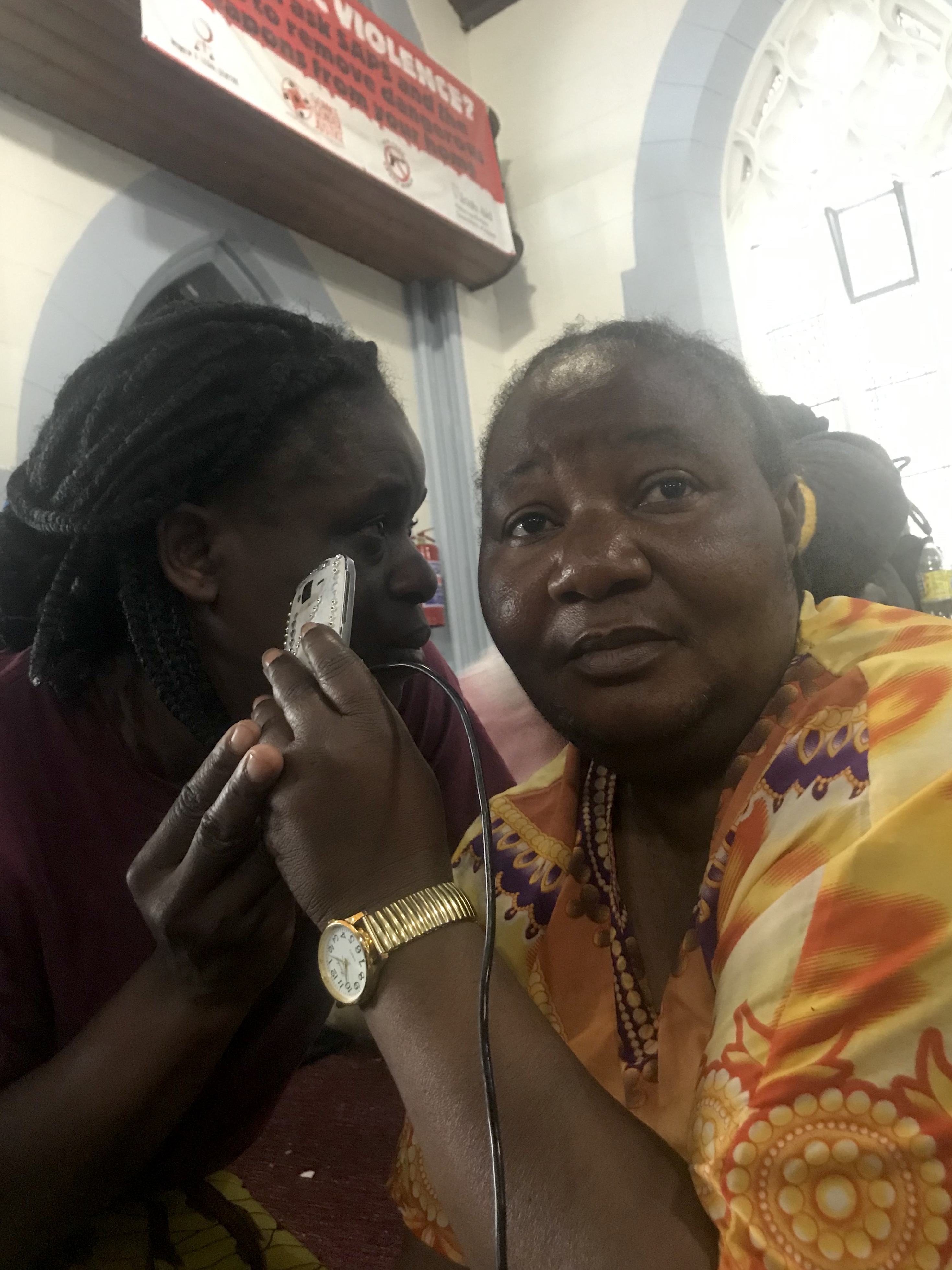
Samuel Ndala outside a friend’s home in Cape Town a few months before his death on November 24.
Creative, with a flair for French rap, Samuel Ndala dreamt of becoming a hip-hop star. He was often seen with headphones, rapping along to music on his gem-encrusted mobile phone.
Samuel grew up in Kasumbalesa, a teeming border town between the Democratic Republic of Congo and Zambia, with up to 500 long-haul trucks cleared daily though the chaos. Here, his father worked for the DRC’s immigration control under the Joseph Kabila regime.
On 4 September 2015, Samuel’s life turned upside down.
Mercenaries broke into his family’s home, killing his father with a gun. This was because of his father’s connection to the president.

Inside the Central Methodist Church, Emmanuelle Kanyiki and Sanga Mukokolily listening to a rap song recorded by Sanga’s deceased son, Samuel.
Petrified that the killers would return, Samuel’s mother, Sanga Mukokolily, fled their home, piling her two children: Samuel, 12, and Kapinja, 5, into a south-bound truck.
Fueled by dreams of safety and opportunity, the family made the perilous 1,500km journey to South Africa over two years, crossing the Musina border in 2017. After two weeks in Johannesburg, they boarded a bus to Cape Town. And this is where Samuel’s bones will remain.
Aged 16, Samuel was one of four teenagers who drowned off Three Anchor Bay on Sunday, 24 November 2019. A sweltering day, the youngsters, who had been living rough at the Central Methodist Church on Greenmarket Square, had taken a stroll to the beach, seeking to cool down and to get clean in the waves.
Samuel, Annastasie Moshi, Edo Muhumini and Nduwamungu Damour, were buried at Maitland cemetery on Friday, 6 December, following a funeral service at St George’s Cathedral.
The day after the funeral, inside the Central Methodist Church, Sanga Mukokolily was reeling with grief.
Slumped in a heap on a blanket behind the back pew, she is floating in and out of sleep.
The spokesperson for 700 refugees housed at the church, JP Balous, leans down, gently tapping her on the shoulder. She sits up and they speak in French. Eyes glazed, she nods her agreement to be interviewed. There is a small bustle and Emmanuelle Kanyiki joins us on the blanket to translate. Back home in the DRC, Emmanuelle used to work as a teacher.

Inside the Central Methodist Church.
It’s hot inside the church. And dim. Next to us, a baby is crying, tears running down his cheeks. Beside him, women are eating Nigerian egusi (a West African dish made from ground seeds) from styrofoam dishes.
Who was Samuel?
“My child was kind and clever, creative,” says Sanga. She is speaking slowly; Emmanuelle is translating her words. “He made boats and planes from anything, for example from old slip-slops or just of paper. Our life was tough, he made toys to play with for himself and for his sister. He could fix electricity, he could fix any electrical problem. »
Emmanuelle’s hand is resting on Sanga’s thigh. Sanga’s birthday is December 11, when she turned 50 years old.
“He loved French rap,” she continues. “He was always singing. We have a recording of him singing, rapping, here on his phone.” She rummages in her handbag, producing a mobile phone covered in diamante detail. Then, Sanga calls to her nine-year-old daughter, Kapinja, a smiling girl with braids in a pink frock, to help her work the phone to find the track. Seated on the blanket, we pass the phone around, listening to Samuel rap.
“He was good,” says Emmanuel, stroking Sanga’s leg.
“My children is all I have in this life,” says Sanga. “I am in pain.”
Turning the conversation to the fateful Sunday two weeks ago, she says: “The four of them met here at the church. We don’t have a place to shower and that Sunday was a very hot day. They didn’t tell us they were going to the beach, they just walked off, walking all the way there. Samuel had not swum before. None of them could swim. That afternoon, we were just sitting here, when a man brought the news.”
According to the National Sea Rescue Institute, the teens got caught in a rip current after a wave swept them out to sea.
“She’s been crying since Samuel’s death,” says Emmanuelle. “I’m always with her and now is the first time she’s quiet. I don’t know what to say, it’s happened now, we can’t bring the child back. But the hurt is indescribable. Yesterday, at the funeral, it was a really difficult day for her. I could see the pain in her face. But going to the undertaker the day before, that was even worse. That upset her a lot, she could not speak, she could not eat. The only thing about her child she could recognise was his feet. She did not recognise his face. There’s too much pain.”
Another woman joins our circle: Leticia Barumawaki, Sanga’s cousin. “Samuel was a good boy, a sweet boy,” says Leticia. “He helped his mother so much. Because as a family they went through a lot, then this accident happened.”
Why did they leave home in the DRC?
“So one night, mercenaries attacked their house, because her husband worked at immigration, for the president, they shot and killed him,” says Emmanuelle, gesturing with two fingers against her temple. “In the DRC this is common. People who knew her helped her get into a truck with her two kids, because what if the killers returned? From there they traveled through Zimbabwe and then to South Africa. We had all heard South Africa is a democratic country and safe for refugees.”
But once in South Africa, they realised this was not the case.
Sanga and her family took refuge in Tygerberg, on Cape Town’s northern fringes. A pastor took pity on them and allowed her to sell mikate – traditional Congolese vetkoek – in front of his church. While Samuel was not allowed to attend school due to his “lack of papers”, he completed a course in English.
But as so-called foreigners, they felt threatened.
“It’s hell,” says Emmanuelle. “It’s hell here in South Africa. In Congo, there is Shoprite, MTN, Vodacom and KFC. South Africans, they are welcome there. But here! My husband is a cab driver, they wanted to kill him at gun point. They told him: ‘You people are coming to take our jobs. We kill you.’”
Leticia adds that she cannot find work in South Africa, this despite being a qualified chef with 13 years experience. “Now is the season for chef work, it is so frustrating,” she says. On her phone, she scrolls to a job advertisement. “See here: ‘South African nationals only’,” she reads, adding: “We cannot make a living here in South Africa, the only option is for our husbands to work for Uber Eats.”
Sanga looks exhausted. She nods good-bye.
Outside the church, people are kneading dough in large buckets; cooking bread on coal fires lit in tins. Two men are leaning over a board, playing checkers with bottle tops. Ablutions are limited at the church, with refugees brushing their teeth at road drains as tourists stroll by.
Speaking from under a tree flanking Greenmarket Square, Balous says the parents of the other deceased teens had gone to wash at Jesus Saves. Due to the large numbers, they may take a while. Jesus Saves is a Cape Town non-profit organisation that offers ablutions to those who are destitute.
While we talk, a circle of men in sunglasses form around us, keeping a watchful eye. “Close your bag,” says one.
There are strict self-imposed rules governing the 700 refugees living inside and around the Central Methodist Church. At night, women and children sleep inside the church, men on the pavement outside.
Meanwhile, the fate of the refugees turned inside the Cape Town High Court on Monday, 9 December, after the City of Cape Town applied for an urgent interdict to evacuate them from the church. The other respondents were the Department of Home Affairs and the South African Police Service.
Balous represented the group in court.
“I am of the view that the city’s by-laws are not superior, or cannot overtake the Constitution of the entire South African republic,” he says. “I hope the city will think before using their brutal attacks against refugees, and help us find a temporary shelter until when we can leave South Africa for good. »
The case was postponed to Friday, 13 December. MC





















 Become an Insider
Become an Insider